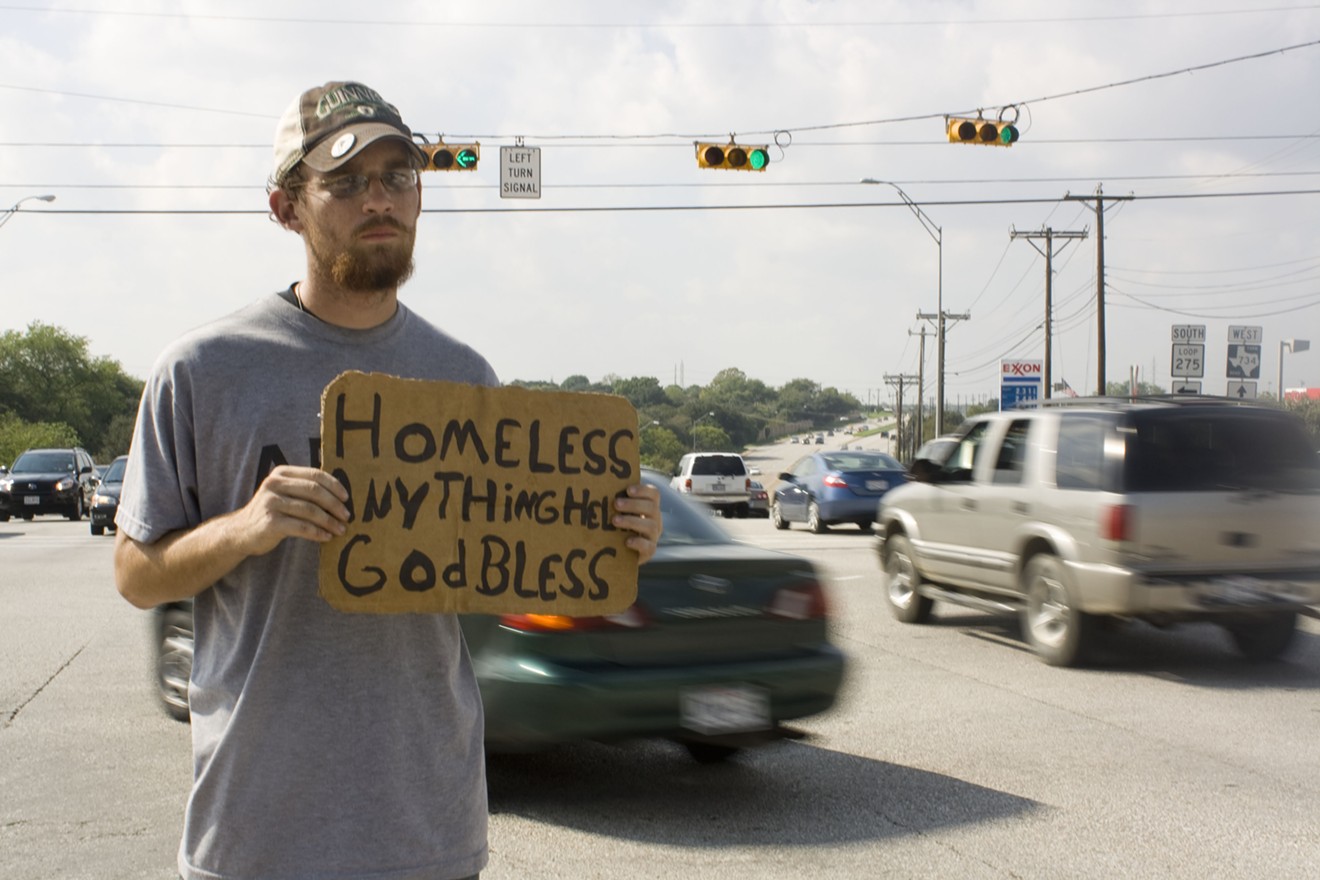She submitted this op-ed to The Dallas Morning News in response to its Jan. 3 editorial in support of the ordinance, which threatens people who stand in roadway medians — namely, panhandlers — with $500 fines. The editorial argued that federal courts should reconsider rulings that panhandling was constitutionally protected speech and "should establish a better balance between free speech and the ability of cities to address public health, safety and quality of life considerations." The News declined to run the op-ed as is, so she shared it with us.
Chained to a bench, with numbers written across their arms, dozens of men waited to be charged with crimes they had not committed. Emboldened by the relentless complaints of a few locals regarding the presence of visibly vulnerable men in the city, the Santa Ana, California, police swept 64 apparently homeless men from the streets and took them to be branded, bonded and billed for crimes, at random. Some were told they had littered, and others were fined for urinating in public or jaywalking. There was little proof that these men had actually committed these crimes, so they were issued general citations for behaviors they were considered likely to have engaged in. Predictably, a lawsuit ensued. Less than six months later, the presiding judge held emphatically: people without shelter cannot be stripped of their rights and treated as second class citizens
The Santa Ana roundup occurred in August 1990, but it could just as easily have been 1940s Germany. As the granddaughter of Holocaust survivors, I’m grateful every day that I live in a country where the Bill of Rights protects me from government intrusion and oppression. But the homeless residents of the city of Dallas — many of whom grew up in the region, attended local schools and worked for several years in local businesses — are not afforded these same rights, under the guise of “safety concerns.” I’m very familiar with these sorts of concerns. They’re the same ones that prompted thousands of Europeans and even local Americans to believe that people of my faith group needed to be expelled and exterminated.
That is why, as a Jewish woman, an American, a Dallas homeowner and taxpayer, and a researcher who studies the experiences of those who are homeless, I, along with three other plaintiffs and the Texas Civil Rights Project, sued the city over its latest attempt to strip the rights of poor people.Painting poor people asking for help as “threats” to public safety just gives governments excuses to violate their rights.
tweet this
Any attempt to limit the First Amendment rights of any American without proof that these behaviors are an actual threat to public safety must be understood for what it really is: an effort to marginalize and criminalize those who are socially constructed as deviant, harmful and unworthy. And just like the harmful behaviors of other states, at other points in time, I have heard the same kind of excuses again.
“Those people threaten public order.”
“Those people are more likely to engage in criminal behaviors.”
“Those people threaten our youth, our culture, our way of life.”
The reality, though, is that painting poor people asking for help as “threats” to public safety just gives governments excuses to violate their rights and push them further to the margins. Suddenly, behaviors that are not problematic in the slightest — such as quietly standing on a median with a sign — feel deeply threatening, and our response to those who engage in these activities is to assume they are criminals. But they aren’t. They’re just poor people asking kind strangers if they might be willing to help.
I believe that my fellow Dallas residents are kindhearted individuals who are deeply compassionate beings. Many Dallas residents likely agree that the city, along with its nonprofit and intergovernmental partners, should take a more proactive approach to combating the root causes of homelessness. And, if the charitable giving trends, frequency of volunteering and calls for donations in the city are any indication, there are thousands of individuals in Dallas who are more than willing to assist those in need.
But, regardless of what residents do to assist their neighbors, it is not up to the city — or the vocal residents who feel uncomfortable at the sight of someone who is socially vulnerable — to determine who is and is not protected by the First Amendment. When we let our city attack the rights of our most vulnerable residents, we weaken the First Amendment for all. That is why we must call on the city to end this cruel ordinance and invest in real solutions to the root causes of economic vulnerability and homelessness.











